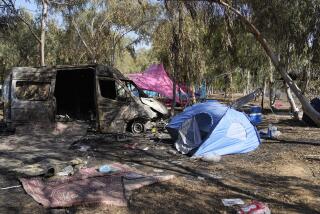Peace Corps volunteers tell lawmakers of sexual assault
- Share via
Reporting from Washington — After Karestan Koenen was raped by a local man soon after she arrived in Niger as a Peace Corps volunteer in 1991, she says, she got no support from local Peace Corps officials and a chilling reception when she was sent back to Washington.
“I was sent to speak with a Peace Corps staff investigator, who said, ‘I am so sick of you girls going over there, drinking, dancing and partying, and then if a guy comes on to you, you say you were raped,’ ” Koenen told a congressional committee Wednesday. “My final straw was when my Peace Corps country director said to me, ‘It’s your word against his. He said you wanted to have sex, and we believe him.’ ”
According to testimony before the House Foreign Affairs Committee on Wednesday, the problem of sexual assault has not abated and the Peace Corps is not doing enough to stop the attacks or to help the victims.
More than 1,000 incidents of sexual assault have been reported by Peace Corps volunteers over the last 10 years, including 115 in 2009. Experts said that number was probably an underestimate because many victims of sexual violence did not report the crime.
“I thought I was alone in my experience, but when I learned that women today were still living through what I thought had been dealt with decades ago, I knew I had to come forward,” said Carol Clark, who was a Peace Corps volunteer from 1984 to 1985 in Nepal.
Clark said she was raped in two different incidents by Nepalese men, one of them her Peace Corps program director. Back in the United States, Clark was assigned a counselor who told her that because she had failed to learn from the rapes, she had a personality disorder. Clark described the counselor as “a cruel and judgmental adversary.”
Several members of the committee vowed to the witnesses that they would pass legislation to reform the Peace Corps.
“We have a profound obligation to our volunteers to do everything possible, not only to improve their safety and prevent these crimes from occurring, but to respond effectively in emergency situations,” said Rep. Howard L. Berman (D-Valley Village), the ranking Democrat on the committee. “There is no excuse for failing to treat survivors with dignity and compassion.”
Peace Corps Director Aaron Williams said his organization was committed to reform and had been working to reduce danger and improve response to incidents of sexual violence. He said the Peace Corps had recently appointed a victim’s advocate who would coordinate support services; developed new training processes for staff that would start this summer; and was collaborating with the Rape, Abuse and Incest National Network, an anti-sexual violence organization, to improve understanding of proper victim treatment.
“Rest assured that this type of thing — blaming the victim — will not continue in the Peace Corps today,” Williams said. “We have to listen to our volunteers.”
Former volunteers and experts say more needs to be done.
Koenen, now a clinical psychologist who studies stress-related mental disorders, said the aid that victims received within 24 hours of the incident was crucial to long-term mental health. She suggested that the Peace Corps employ mobile victim’s advocates who can travel quickly to sites to help victims through the process of medical exams, police reports and initial counseling.
Other suggestions presented at the hearing included providing travel companions for flights back to the U.S. and creating an official victim’s advocate for every region the Peace Corps serves.
“It’s time for a systemic, permanent solution that addresses better training for volunteers, training for in-country staff, and appropriate vetting and accountability for staff in the United States,” Koenen said.
More to Read
Sign up for Essential California
The most important California stories and recommendations in your inbox every morning.
You may occasionally receive promotional content from the Los Angeles Times.










